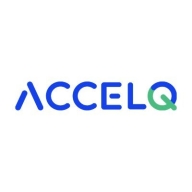

OpenText Functional Testing for Developers and ACCELQ Automate compete in software testing. OpenText offers stronger customer support and pricing flexibility, while ACCELQ is seen as a more comprehensive tool due to its robust features.
Features: OpenText Functional Testing for Developers offers powerful script creation, integration with major CI/CD tools, and support for multiple programming languages. ACCELQ Automate features codeless testing, an intuitive design, and AI-driven test automation, focusing on reducing manual input, making it a more innovative platform.
Ease of Deployment and Customer Service: OpenText provides easy deployment with strong troubleshooting support. ACCELQ's cloud-based model simplifies deployment but has less favorable customer service compared to OpenText. However, ACCELQ's ease of adoption compensates for this.
Pricing and ROI: OpenText is cost-effective with transparent pricing, ensuring steady ROI through reduced maintenance costs. ACCELQ's investment is higher, yet its advanced functionalities and reduced manual workload offer higher long-term ROI, making its price-performance ratio favorable.
| Product | Market Share (%) |
|---|---|
| OpenText Functional Testing for Developers | 2.6% |
| ACCELQ Automate | 1.3% |
| Other | 96.1% |


| Company Size | Count |
|---|---|
| Small Business | 2 |
| Midsize Enterprise | 12 |
| Large Enterprise | 29 |
The most powerful test automation tool for web, desktop, mainframes and more.
OpenText Functional Testing for Developers offers robust automation capabilities with support for complex algorithms, multi-platform testing, and developer-friendly integration using C# and Java, facilitating seamless testing transitions and efficient automation workflows.
This testing tool is highly valued for its integration with ALM and Jenkins, along with its developer-focused environment adaptable to Eclipse and Visual Studio. With AI-based object recognition, an object repository, and test framework integration, it bolsters DevOps practices while reducing IT workloads. Supporting UFT to LeanFT transition, it caters to SAP, Java, .NET environments, and more. Enhanced with stable automation, extensive protocol support, and both on-premises and cloud deployments, it targets performance, regression, and functional testing, while recording and screengrabs enhance automation capabilities. Future improvements could include expanded browser compatibility, enhanced JavaScript and mobile support, and better object recognition.
What are the key features of OpenText Functional Testing for Developers?Organizations implement OpenText Functional Testing for complex test automation on desktop, web, and banking applications, supporting performance, regression, and functionality testing across environments like SAP, Java, and .NET. UFT aids in GUI, infrastructure, and ERP application automation, with deployment options including on-premises and cloud implementations. Enhanced screengrabs and recording features aid in practical test case development, while addressing emerging technology needs is a focus.
We monitor all Test Automation Tools reviews to prevent fraudulent reviews and keep review quality high. We do not post reviews by company employees or direct competitors. We validate each review for authenticity via cross-reference with LinkedIn, and personal follow-up with the reviewer when necessary.